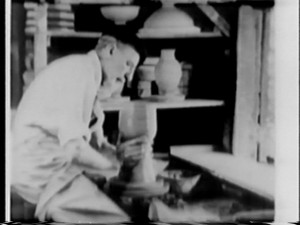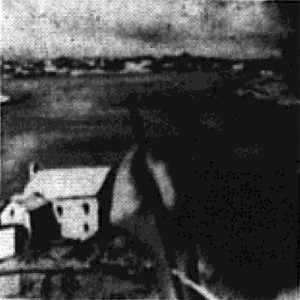"An Old Oak Production. 38 minutes. Produced by Joan Baldwin, Chris Von Erpecom. Handwritten title cards throughout with sound of sleighbells ringing just during cards. Begins with snowy scenes of house and barn, snowblower. Views of Ogunquit, Maine, including Ogunquit post office. Interiors with parties and holiday activities, man at piano plays medley of carols. A sequence of three women with dogs and cats, "Joan wants to take a picture of the animals. Looks like the Bronx zoo." Woman with still camera is likely Joan, who has a 16mm camera on a tripod. The voice is distinctively mid-century media influenced. Views of gift exchange." oldfilm.org

"Ceramics, by Kenneth V. Bloomer, ACL, and Elizabeth Sansom, ACL, is probably the most ambitious amateur film ever attempted on this particular subject and perhaps stands alone in its field. The makers of the film were fortunate in having the cooperation of a famous ceramic artist, Leon Volkmar, who maintains his atelier at Bedford Village, N. Y. It was here that the entire film was produced, its makers having imbibed the spirit of the artist craftsmen so thoroughly that every deft touch, every careful step in the process of making a lovely vase are recorded. The interior lighting and closeup technique are especially good, particularly in those parts where only the delicate focusing of a closeup will reveal the nuances of the artist's touch as he models. The sequences which show the firing of the pottery are unusually well handled and the whole is outstanding in its clarity of continuity. Such a film might be described as a "glorified industrial" but, more than that, it is an educational film in the best sense of the word." Movie Makers, Dec. 1933, 499-500.
"doc. didattico"/educational documentary
"A Century of Progress, the one reel record of the Fair in Kodacolor, by Edmund Zacher, II, ACL, is distinguished by the freshness of its dramatic treatment rather than by the faultless excellence of technique. In this latter field, Mr. Zacher, choosing to experiment along relatively unblazed color trails (slow motion, night photography, dissolves, etc.) has on occasion made slight errors, a fact which he himself is the first to admit. Dramatically, however, his film is a joy and a delight, replete with human interest, unhurried but unflagging in its presentation of the Fair from ever fresh viewpoints." Movie Makers, Dec. 1933, 523.
"Among the ten best, Century of Progress, in Kodacolor, by Herbert H. Johnson, ACL, is a striking illustration of the degree of perfection that color motion picture photography has attained. Its studied angles and dignified composition are augmented by excellent photography. Mr. Johnson paid careful attention to the very important point of exact exposure in relation to color value and, as a result, brought a new version of the Fair to the one who had never seen it in color before. By taking plenty of time he was able to single out the best camera positions and wait for the lighting that was most favorable. The excellent handling of the camera brought a sense of intimacy to each scene. The film's only fault is an excessive use of lap dissolves which detracted somewhat from the smoothness of the continuity." Movie Makers, Dec. 1933, 499.

Kodachrome travelogue showing life and culture in Guatemala and Panama.
"The 1966 Centennial canoe race, including preparations at Tulista Park in Sidney, the race and the finish. Good close-ups of the canoeists. A large, three-masted sailboat -- possibly an imitation Chinese junk?" British Columbia Archives.

"Making cement for Blue Circle Cement company at the West Medina Cement Works on the Isle of Wight. Footage of the clay fields and chalk quarries, blasting operations, coal and gas retorts, mills, the silos, kiln, clinker being ground into cement, testing for calcium content and crush testing, packing and transport" (EAFA Database).

""That Which Makes the Picture" introduces its audience to the art of painting. Using a charming New England harbor scene, the viewer is shown the beginning sketches, the application of the basic colors, and the finishing touches to completion. After viewing the film, one has a greater appreciation for the care and attention to detail required of the artist working in oil paints" PSA Journal, Oct. 1963, 41.
"doc. didattico"/educational documentary
Total Pages: 299